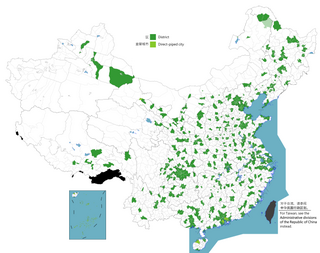
The Hui people are an East Asian ethnoreligious group predominantly composed of Chinese-speaking adherents of Islam. They are distributed throughout China, mainly in the northwestern provinces and in the Zhongyuan region. According to the 2011 census, China is home to approximately 10.5 million Hui people. The 110,000 Dungan people of Kazakhstan and Kyrgyzstan are also considered part of the Hui ethnicity.

The Nine Chapters on the Mathematical Art is a Chinese mathematics book, composed by several generations of scholars from the 10th–2nd century BCE, its latest stage being from the 2nd century CE. This book is one of the earliest surviving mathematical texts from China, the first being Suan shu shu and Zhoubi Suanjing. It lays out an approach to mathematics that centres on finding the most general methods of solving problems, which may be contrasted with the approach common to ancient Greek mathematicians, who tended to deduce propositions from an initial set of axioms.

The term district, in the context of China, is used to refer to several unrelated political divisions in both ancient and modern China.

Gu is a Chinese family name. Some places such as South Korea, and early immigrants from Wu-speaking region in China usually romanize this family name as "Koo" or "Ku". It is the 93rd name on the Hundred Family Surnames poem.
Fu Gu (209–255), courtesy name Lanshi, was an official of the state of Cao Wei during the Three Kingdoms period of China.

Ding is a Chinese family name. It consists of only 2 strokes. The only two characters that have fewer strokes are "一" and "乙".
Ko, also variously romanized Go, Goh, or Koh, is a common Korean family name. As of the 2000 South Korean census, there were 435,000 Kos in South Korea, accounting for just under 1% of the population. Liaoyang based Go family is The Royal of Goguryeo, Northern Yan ruler Gao Yun, Tang Dynasty general Gao Xianzhi has Goguryeo origin. In South Korea, Hoengseong Go clan is also descended from the Royal dynasty of Goguryeo and the clan's genealogy book specifies Dongmyeong of Goguryeo as the direct ancestor. Japan's Koma (高麗) clan is also descendant of royal dynasty of Goguryeo. Chinese character 高麗 (Koma) originates from Goguryeo's abbreviated name, but in Japan, 'ryo' is pronounced as 'ma'. Koryo is also the name of 10 century Korea name unified and founded by Wang dynasty, a noble family originating from Goguryeo (Koguryo), and presently known name of the country, Korea. These Go clans in three countries are called Goguryeo Go in common. Thus, it can be said the part 'Ko' from 'Korea' originates from the surname 'Ko', Ko(gu)ryo Dynasty surname.
Liao is a Chinese surname, most commonly found in Taiwan and Southern China. Statistics show it is among the 100 most common surnames in mainland China; figures from the Ministry of Public Security showed it to be the 61st most common surname, shared by around 4.2 million Chinese citizens.
Shi or Shih is the romanization of a Chinese surname. It means "stone." It was one of the "Nine Sogdian Surnames." A 2013 study found it was the 63rd most common surname, shared by 4,550,000 people or 0.340% of the population, with Henan being the province with the most people.
The literary inquisition, also known as speech crime (以言入罪), refers to official persecution of intellectuals for their writings in China. The Hanyu Da Cidian defines it as "the ruler deliberately extracts words or phrases from intellectual's writings and arbitrarily accuse him in order to persecute him" ("旧时谓统治者为迫害知识分子,故意从其著作中摘取字句,罗织成罪"). The Inquisition took place under each of the dynasties ruling China, although the Qing was particularly notorious for the practice. In general, there are two ways a literary inquisition could be carried out. First is that the conviction came from the writing itself. That is, the writing was the direct cause of the persecution. The second is that the writing was used as a tool to provide legitimate evidence for a predetermined conviction. Such persecutions could owe even to a single phrase or word which the ruler considered offensive. Some of these were due to naming taboo, such as writing a Chinese character that is part of the emperor's personal name. In the most serious cases, not only the writer, but also their immediate and extended families, as well as those close to them, would also be implicated and killed.
Jiangnan sizhu is a style of traditional Chinese instrumental music from the Jiangnan region of China.
Among Buddhists, death is regarded as one of the occasions of major religious significance, both for the deceased and for the survivors. For the deceased, it marks the moment when the transition begins to a new mode of existence within the round of rebirths. When death occurs, all the karmic forces that the dead person accumulated during the course of his or her lifetime become activated and determine the next rebirth. For the living, death is a powerful reminder of the Buddha's teaching on impermanence; it also provides an opportunity to assist the deceased person as he or she fares on to the new existence. There are several academic reviews of this subject. In Buddhism, death marks the transition from this life to the next for the deceased.
The Patriotic Martyrs' Cemetery is a national cemetery in North Korea located in Sinmi-ri, Hyongjesan-guyok, Pyongyang. Founded on September 17, 1986, it is officially reserved for people who contributed to the "liberation of the country" and "socialist construction". Buried here are many veterans of the Korean independence movement, army and national officials, and outstanding citizens in the fields of science, medicine, and literature.

Sin Ik-hui was a Korean independence activist and politician during the period of Japanese rule. He was Speaker of the National Assembly during President Syngman Rhee's first term and second term. His nickname was Haegong or Haehu ; his courtesy name was Yeogu.
Xun Can, courtesy name Fengqian, was a Chinese xuanxue philosopher of the state of Cao Wei in the Three Kingdoms period of China. He was a son of Xun Yu.
Mu is the pinyin romanization of several Chinese surnames.
Gu Hui, courtesy name Zitan, was an official serving under the warlord Sun Quan in the late Eastern Han dynasty of China. He was a younger brother of Gu Yong, the second Imperial Chancellor of the state of Eastern Wu founded by Sun Quan in the Three Kingdoms period.
Ma Ju-lung or Ma Rulong may refer to:
Gǔ (谷) is a Chinese surname. According to a 2013 study it was 158th-most common surname in China, shared by 990,000 people or 0.075% of the population, with the province having the most people with the surname being Henan. The literal meaning of the surname is "valley" or "gorge".
Gu Hui was a general (shangjiang) of the People's Liberation Army (PLA). He was an alternate member of the 13th Central Committee of the Chinese Communist Party and a member of the 14th Central Committee of the Chinese Communist Party. He was a member of the Standing Committee of the 9th Chinese People's Political Consultative Conference.





